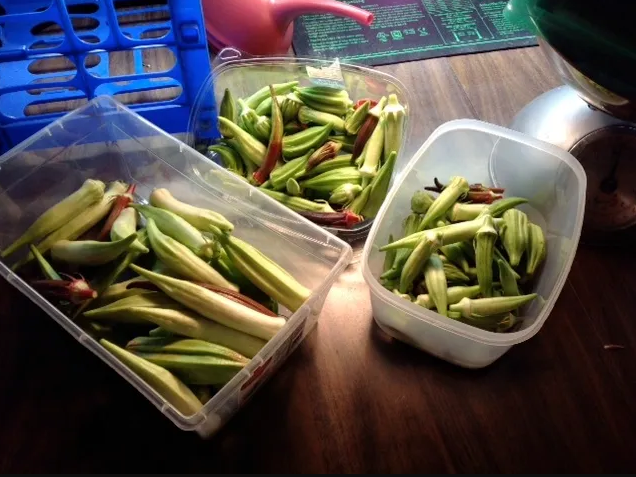Written by Dell deChant

Did you know? It is okra season in Florida and throughout the south, and here in New Port Richey we’ve been growing it for years. Okra is also one of those wonderful foods of the Florida summer that can be grown in great quantities, is highly nutritious, and easy to prepare, with dozens of recipes available for quick and easy meals. Unfortunately, like many other terrific summer crops, okra is largely absent from our Florida diet, and increasingly the American foodshed.
Once a staple of Florida’s summer cuisine, okra has been marginalized and nearly forgotten due to industrialization and globalization of food production. Today, in the Tampa Bay region, locally grown okra is virtually impossible to find, and “fresh” okra is available, if at all, largely at commercial grocery outlets. Of course, “fresh” (or the corporate marketing brand, “fresh from Florida”), is a relative term and plenty of “fresh from Florida” produce is industrially produced, non-organic, and often several days old when it reaches grocery stores.

While this situation is a bit gloomy, the good news is that right here in New Port Richey, the urban agrarian center of West Pasco and the Springs Coast Watershed, a different okra story is being told. All natural, locally sourced okra is thriving here, and available for anyone who is interested – contingent, of course, on the size of weekly harvests. Like the mangos of our recent two-part series, there is still not enough okra being grown; and still not enough education and media coverage on growing, harvesting, and preparing this wonderful food-gift of the Florida summer. Remember, we live in a state, where one of the most common disses we hear around this time of year is: “you can’t grow anything in Florida in the summer.” Tired of hearing that? Well, you are in good company here.
A major project of New Port Richey FarmNet is developing a local food system based on principles of agrarianism, food-sovereignty, and ongoing education. We are dedicated to helping folks discover the benefits and opportunities (even joys) of a healthy and thriving local food system with abundant seasonal produce easily available to everyone in the community, and a local-first commitment to food production and consumption. So, yes, if you are tired of the you-can’t-grow-anything-in-Florida-in-the-summer blathering, here we are – and right now, in late summer, here we are with the annual Okra Occasion.

The Okra Occasion (called the OO for short) began nearly a decade ago when the New Port Richey Environmental Committee wanted to further expand awareness of urban agriculture in the city and promote an easy to grow summer crop. It didn’t hurt that then, as now, most present-day Floridians were unfamiliar with okra. Many have never heard of okra, others tried it once and didn’t like it, and still others have tasted only fried okra. This unique circumstance gave the idea of an okra festival a bit of publicity, and awakened curiosity in the community. It also let okra fans come of the closet and gave them a supportive and welcoming environment to enjoy one of their favorite foods. The first OO was fun as they have been ever since. They’ve also always been educational and will be again this year.
Most importantly, the OO affirms and witnesses the benefits, opportunities, and joys of a local food system. Okra is an example of these benefits, opportunities, and joys. Here is a summer vegetable that is loaded with vitamins and minerals, contributes to heart health and possibly reduces cancer risks (healthline.com). Anyone can grow okra and grow it in quantity. FarmNet has localized seeds and seedlings, and classes on how to grow seasonal crops – like okra. We’ll have those localized seeds available at the OO and information about classes on local food production and other agrarian educational programs.

Of course, growing okra or any seasonal food is only the beginning. We also need to learn how to prepare it. That’s the fun part for many of us. It also is a very important part of the story – especially in the case of okra. Okra is not the only local seasonal vegetable that we don’t know how to prepare. The same can be said about sweet potato leaves, pigeon peas, and black-eyed peas – even luffa. For now, our interest is in okra and like the tired old grumble about not-growing anything-in-summer, there’s a grumble about not knowing how to prepare local produce – like okra. As we learn how to grow seasonal local food, we also are learning how to prepare it. In the case of okra, the OO will include delicious dishes to sample, recipes for dishes offered for sampling, and whole recipe books dedicated to okra.
Everyone is welcome to join us at the OO. There is no fee although space is limited. What is not limited is the opportunity to participate in New Port Richey’s agrarian adventure. Food production is something everyone can do; and anyone can grow plenty of healthy, nutritious crops every season of the year – including summer. Okra is one of many examples, and we celebrate it in the late summer every year. Anyone can grow a little, and those with time, energy, and growing space can grow quite a lot and harvest plenty to share or sell. A local okra harvest several years ago topped 100 pounds. That’s the record – so far! We have not come close to that quantity since the pandemic, but there is no reason why that record can’t be broken next year. No reason that by 2025, we could not double that harvest; and, if more growers get involved, there is no telling how much could be grown – returning this wonderful seasonal vegetable to its once familiar status as a staple of Florida’s summer cuisine.
Sources, Resources, & Research
The history of Okra | Where does okra come from?
https://www.uaex.uada.edu/yard-garden/resource-library/plant-week/okra.aspx
Okra: How it Got to the United States, How to Grow it and How to Eat it
https://www.pomona.edu/farm/blog/posts/okra-how-it-got-united-states-how-grow-it-and-how-eat-it
7 Nutrition and Health Benefits of Okra


Leave a Reply